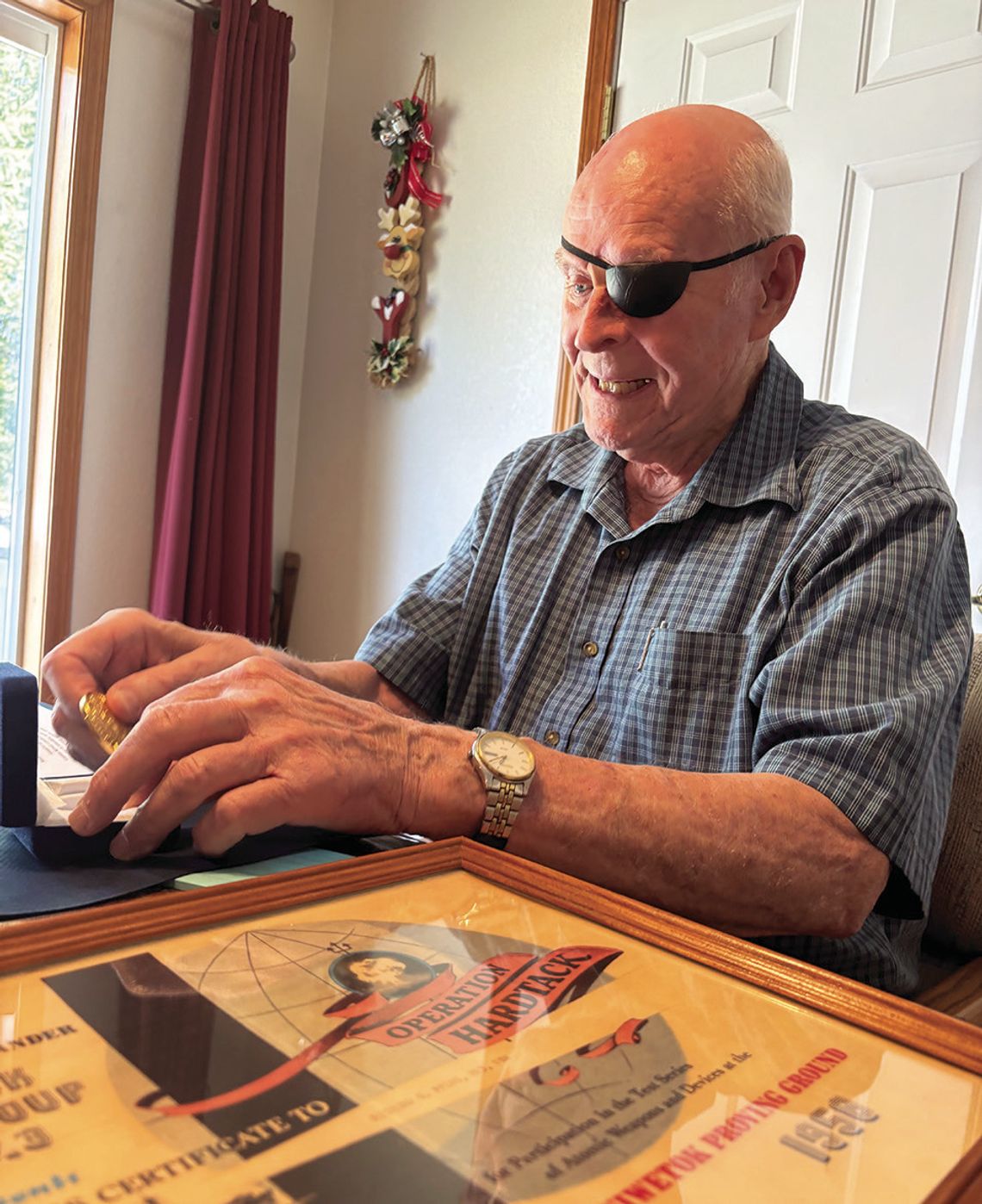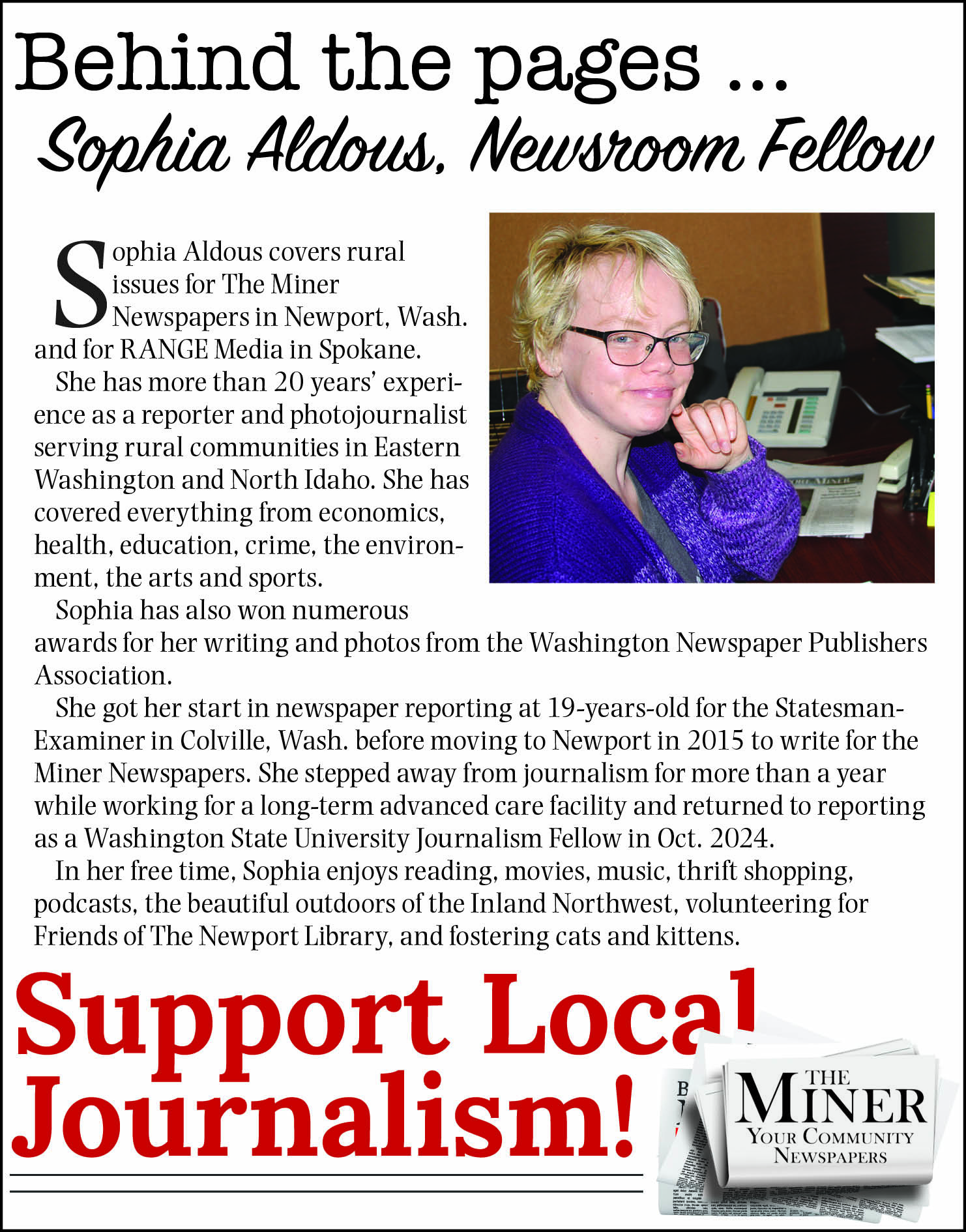NEWPORT - Richard Phlug adjusted the patch over his left eye and looked over with his right, seeming somewhat apologetic.
“I don’t know how you feel about medical stuff like wounds, but I don’t want to make you uncomfortable,” Phlug said.
The 88-year-old Navy veteran and Newport resident lost his eye due to cancer earlier this year. A disease which could have been caused by Phlug’s military service at the Enewetak Proving Ground, also known as Enewetak Atoll, a major site for United States nuclear weapons testing in the Marshall Islands. A total of 43 nuclear tests were conducted at Enewetak between 1948 and 1958. These were part of the 67 total nuclear tests done throughout the Marshall Islands between 1946 and 1958, the most well-known perhaps being Bikini Atoll. The nuclear tests went on to cause significant radiation contamination, displacing the native Marshall Islanders and causing long term health and environmental consequences, with an estimated 400,000 American servicemen involved in nuclear testing in the Pacific. These servicemen, along within those stationed in Hiroshima or Nagasaki after World War II, are referred to as Atomic Veterans. The term emerged in the seventies and eighties when veterans began to speak out about their experiences, advocating for support and recognition.
Now, Phlug is applying for benefits from the United States Department of Veteran Affairs in the hopes the VA will pay for an ocular prosthesis. Phlug’s private insurance, Premera Blue Cross, has declined to pay for the prosthetic.
“I worked for Grand Coulee Dam as their tool shop manager for 32 years, so I always had good private insurance,” Phlug said. “But they won’t pay for this (prosthetic) and I think it would be more comfortable on my face and maybe not be so unsettling for other people to look at.”
Phlug was stationed on the U.S.S. Renville as a Machinist’s Mate Second Class in 1958 after he joined the Navy when he was 18.
“I was a young kid from Nebraska who was sick of cornfields,” he said, chuckling. “I didn’t want to stay there; I wanted to see more of the world.”
The first nuclear test he was a part of, he remembers being called to muster on the Renville’s deck. He and his unit were ordered to face away from the coming blast to avoid flash blindness. Phlug remembers a bright flash of light and then a deep rumbling sound that reverberated through the air. Then Phlug said he and his shipmates felt a rush of hot air at their backs.
“After that you’d get called up to the deck sometimes for a test, other times other units would,” Phlug said. “We were young, and I don’t think a lot of us really understood what the fallout would be. I didn’t.”
In June of this year, Phlug received the Atomic Veterans Commemorative Service Medal and certificate from the Department of Defense recognizing the four years he spent in the Navy.
However, Phlug doesn’t consider himself an activist or hero. He was reluctant to “make too much” of his service or the potential effects on his health. The only reason he agreed to an interview with The Miner was because his neighbor and friend Lee Shaver encouraged him to do so.
“There are guys out there who are really sick and don’t have the kind of luck and help I have had,” Phlug said, gesturing to his eye. “Obviously, this hasn’t been fun and I’m certainly not planning on dying any time soon, but I’ve gotten to live a long life. A lot of other guys haven’t been so lucky.”
Last summer, Phlug said he went to Northwest Dermatology for what at first was thought to be melanoma near his nose. It was removed, but several weeks later another red patch emerged. After getting an MRI at his doctor’s office, Phlug was diagnosed with squamous cell carcinoma. He underwent chemotherapy for almost three months, causing pain in his face, head, gums and the removal of his left eye. Though his cancer went into remission, Phlug still has discomfort in the nerves around his nose, his gums are still sore, and he has a consistently congested nostril.
As of yet, it is unknown if the VA will agree to pay for the eye prosthetic, but Phlug said he is grateful for his daughter and the help of the VA staff in Spokane. Phlug’s wife of 65 years, Linda, passed away last fall. He would visit her almost every day when she was living in an advanced care facility. Phlug admitted it has been difficult dealing with cancer and the ensuing paperwork and phone calls that come with getting government wheels turning to hopefully pay for the prosthetic.
“The people I am working with (at the VA) have been wonderful and thankfully my daughter, son-in-law and certain friends check in on me,” Phlug said. “I just miss Linda. It’s been lonely without her. I miss my friend.”
SOPHIA MATTICE-ALDOUS IS A MURROW NEWS FELLOW WORKING DIRECTLY WITH NEWSROOMS AT THE NEWPORT MINER AND RANGE MEDIA THROUGH A PROGRAM ADMINISTERED BY WASHINGTON STATE UNIVERSITY. HER REPORTING IS AVAILABLE FOR USE VIA CREATIVE COMMONS WITH CREDIT.
.png)














